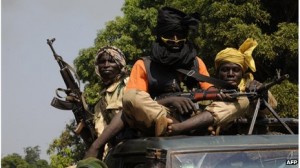 (AP) — Rebels in Central African Republic on Thursday dismissed the president’s offer to release some political prisoners, saying the fighters would still consider retaking up arms despite signing a peace agreement two months ago.
(AP) — Rebels in Central African Republic on Thursday dismissed the president’s offer to release some political prisoners, saying the fighters would still consider retaking up arms despite signing a peace agreement two months ago.
The move deepens concerns that the rebels could again fight against the government, further destabilizing the desperately poor country that had weathered a similar threat from armed groups back in December.
Rebels from the alliance known as Seleka later joined the government of President Francois Bozize as part of a deal that allowed him to finish his term in 2016.
Cracks have since emerged in the agreement, and the rebels had set a Wednesday deadline for Bozize to meet their demands.
They are seeking the integration of some 2,000 rebel forces into the national army and the departure of South African forces on assignment in the country.
“If the government does not fulfill all our demands, it’s the head of state who has chosen a course leading to war,” said rebel spokesman Col. Sylvain Oumar Bordas.
In his presidential decree announced late Wednesday, Bozize said that roadblocks put up around the capital as part of a curfew imposed in December would be removed. Critics say the roadblocks have been used to illegally arrest people accused of having ties to rebels in the country’s north.
Bozize also agreed to release some of the prisoners being held though it would not be extended to those accused of posing a risk to state security or those being held on illegal weapons charges.
As tensions grew, mediators remained hopeful that a compromise could be found before hostilities would resume.
Margaret Vogt, the U.N. special representative for Central African Republic, told reporters in New York on Wednesday that the United Nations and neighboring countries that negotiated the peace agreement are working hard on its implementation.
“The ultimatum ended today, and the indication we got was that they were prepared to allow a bit more time for negotiations to take place.”
She said governments of national unity are extremely difficult to implement, and the situation hasn’t been made easier by the fact that Seleka controls three-quarters of the country and the government’s military force “is in disarray.”
Central African Republic has had numerous attempted power grabs over the years, but the Seleka rebels’ advance last December through towns in the north marked the most significant threat to Bozize’s government since the president took control following a 2003 rebellion.
The rebel fighters threatened to advance on the capital, Bangui, if Bozize did not step aside. The crisis prompted Chad, Republic of Congo, Cameroon and Gabon to send soldiers to Central African Republic.






